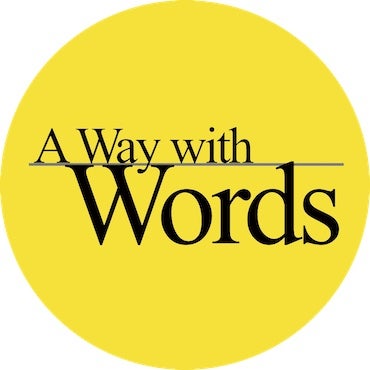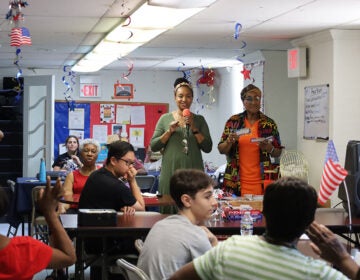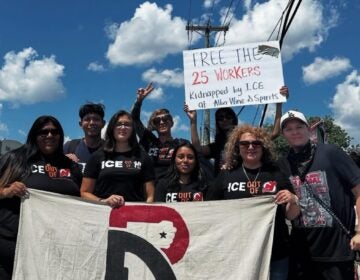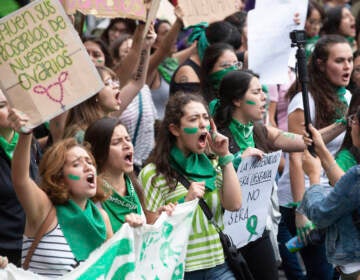Teen girl leaders in a pandemic: Fight for what’s right, then groove to BTS
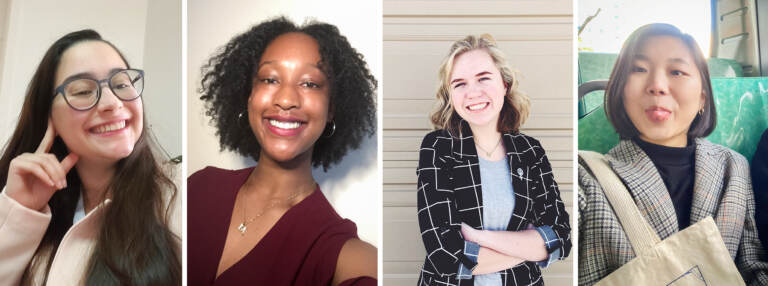
From left: Giovanna Basso, Mofiyin Onanuga, Emma Fetzer and Joanne Lee are teen leaders for the U.N.-sponsored gender equality group Girl Up. They attended Girl Up's virtual conference last week, which featured Nobel Peace Prize winner Malala Yousafzai as a guest speaker. (Giovanna Basso, Mofiyin Onanuga, Emma Fetzer, Joanne Lee)
If you ask Giovanna Basso, a teen activist from Brazil, what she’s been doing in the pandemic, she’ll tell you she’s been listening to the South Korean pop group BTS, watching Netflix to improve her English and writing letters in calligraphy to her friends.
She’s also been lobbying the government to provide free menstrual products in schools — and hosting virtual events on gender equality as a leader for the U.N.-sponsored group Girl Up.
For girls like Basso, 19, being a teen and an activist is a balancing act. She was one of more than 4,000 young people who attended the virtual Girl Up 2021 Leadership Summit on July 13 and 14. The conference offered sessions on topics such as gender-based violence, LGBTQ issues, mental health and personal finance. It also featured inspirational speakers such as Nobel Peace Prize winner Malala Yousafzai and Amina J. Mohammed, the deputy secretary-general of the U.N.
Basso and three other Girl Up activists — Joanne Lee, 19, from Seoul, South Korea; Mofiyin Onanuga, 17, from London; and Emma Fetzer, 19, from Provo, Utah — talked to NPR about the challenge of being teen activists in a pandemic. The interviews have been edited for length and clarity.
What are some issues you’ve been working on with girls in your community?
Basso: Period poverty. Since March 2020, Girl Up clubs [in Brazil have been lobbying the government] to approve a law to distribute menstrual products in public schools. Although we got the legislative chamber to approve it, it wasn’t implemented. This was another issue we faced – making politicians accountable to what they promised us.
Fetzer: Toxic masculinity. It’s toxic because men don’t listen to women. [Before the pandemic, we were inviting] boys and young men to come to our Girl Up meetings. They were willing to listen and able to help educate the other men in our school [about gender equality] so that we didn’t have that emotional burden placed on us to educate them. They’re essential in the work towards equality.
How has the pandemic impacted your activism?
Onanuga: This has been the best time for me to engage as an activist. All of the work we’ve been doing now over Zoom has been a lot swifter [due to the ease of collaborating online]. I got the opportunity to emcee last year’s virtual Girl Up summit. If the summit was in-person, I wouldn’t have had that opportunity [to travel to it] because it would have taken place during [the summer term of] my school year.
There hasn’t been a hole in our activism. We’ve been using Zoom to get ready for in-person events. This summer, we’re running a free camp for kids from disadvantaged backgrounds. Our theme is ‘The Activist Within” and we’re teaching them about racial discrimination, gender inequality and climate change.
How do you practice self-care as an activist?
Onanuga: When the Black Lives Matter protests were happening and lots of social injustices were unfolding on TV in 2020, my mental health took a toll. For the first time ever — and I wouldn’t describe myself as emotional — I was really hurting and feeling physically sick. I couldn’t watch the news. I had to take a breather. I went on walks and didn’t use my phone for weeks. During that time, my mental health was a priority. I didn’t plan on doing anything but self-care.
I started doing spoken word [poetry] and turned my anger into something useful and calming. From one of my pieces: “I can’t breathe. What? What are those supposed to be? The last words a human utters before they die? For him, those three words have become an everlasting war cry. I’m not tired, I’m just finding my voice.”
Lee: I always feel guilty turning off the news because I feel like I am choosing to be ignorant. But sometimes you need to find that balance, especially when you’re a social activist. All of us need to recharge. I’ve been taking a break from social media and sharing how I’m feeling with trusted friends rather than solely being on the listening end.
What have you been talking about lately with your friends?
Basso: We’re talking a lot about sexuality, sex and female pleasure. My only sex talk at school was in fifth grade, and it was to answer “Where do babies come from?” As feminist, I decided I should understand more about sex. I began to research. I learned the difference, for example, between a vulva and vagina.
Lee: Since my friends and I are seniors, we’ve been talking a lot about adulting. While we’re in school, we feel confident balancing activism and volunteer work with schoolwork. But what about when we go into the real world? Paying rent, sending money back home to our families — can we manage that with a steady job? Can we still do our activism?
On the other hand, I’m looking forward to the moment I can look back on this moment of uncertainty and fear [as a college student], after — hopefully — growing stronger and more resilient.
What do you do in your downtime?
Fetzer: Lately, I’ve been trying to connect to my inner child so I’m watching things I watched when I was a kid. I recently finished all the Harry Potter movies, and now I’m watching all the Star Wars films.
Onanuga: I find myself gravitating toward documentaries. I recently watched the Greta Thunberg documentary and enjoyed seeing someone my age [do] activism work.
Lee: A new quarantine hobby is being a barber for my grandpa. I’ve been trimming his hair during the pandemic. And I’m proud to say I’ve gotten good reviews.
Jacky Habib is a freelance journalist based in Nairobi and Toronto. She reports on social justice, women’s rights and global development. Follow her on Twitter @jackyhabib.
9(MDAzMzI1ODY3MDEyMzkzOTE3NjIxNDg3MQ001))

